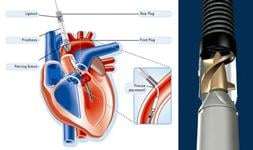
September 29, 2009 – Abiomed Inc. announced new clinical data last week at TCT 2009 from Academic Medical Center’s (AMC) three-year follow-up results from patients in the Impella 2.5 arm of the MACH II trial, revealing improved left ventricular function, cardiac output and quality of life.
The MACH II trial, evaluating safety and feasibility in STEMI, included 20 patients; 10 patients were treated with three days of Impella 2.5 support; 10 control patients were treated with routine standard of care. The initial four-month results, which demonstrated significant recovery of left ventricular function in Impella 2.5 patients, were published in the Journal of American College of Cardiology in 2008.
The three-year follow-up results from MACH II were presented by Jose Henriques, M.D., Ph.D., Academic Medical Center, University of Amsterdam, at the Abiomed customer evening symposium at TCT 2009. The results measured the three-year follow-up of 20 large anterior STEMI patients in the MACH II trial and demonstrated significant overall improvements in cardiac function as well as quality of life in the ten patients that received Impella 2.5 within the trial.
All patients were measured in an IRB-approved protocol that calculated echo results, exercise testing and quality of life, and showed the following results from core laboratory analysis and strict processes. Left ventricular ejection fraction in Impella 2.5 patients increased from 28 percent at the baseline, to 41 percent in the four-month analysis, to 51 percent at the three-year follow-up period. Left ventricular ejection fraction in the control patients increased from 40 percent at the baseline, to 45 percent after the four-month analysis to 47 percent at the three-year analysis. Impella 2.5 patients continued to show improvement in left ventricular ejection fraction, demonstrating a net increase of 23 ejection fraction points while control patients only showed a net increase of seven ejection fraction points.
Abiomed said significant benefit in exercise capacity was demonstrated stronger by Impella 2.5 patients, than control patients, which also improves the quality of life for the patient. Impella 2.5 patients saw no effects on aortic valve at three-year follow-up
“The initial MACH II results demonstrated that Impella had sustained benefits at four months and the three-year analysis, showing a 10 percent increase in ejection fraction, is an even stronger indicator that this device will make a significant difference in AMI treatment,” said Dr. Henriques. “Additionally, these findings could suggest that Impella 2.5 patients who have been discharged have higher rates of recovery and lower chances of hospital re-admittance.”
For more information: www.abiomed.com


 January 05, 2026
January 05, 2026 









